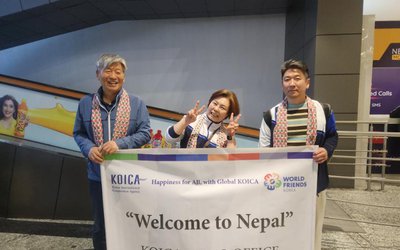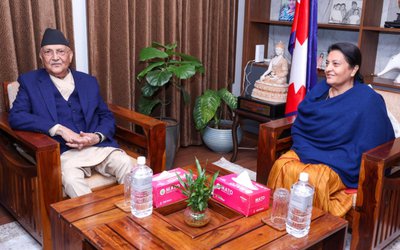Three weeks after the visit of Nepalese Prime Minister Dr. Baburam Bhattarai to India and amidst growing anti-China demonstrations by Tibetan refugees in Nepal, a high-level delegation of the Chinese Communist Party visited Nepal, indicating that the Chinese Prime Minister may come to visit to Nepal within a few months.
Although Nepal Army Chief General Chhattra Man Singh Gurung returned to Nepal after the completion of his official visit to China, assuring the Chinese officials about Nepal’s firm stand not to allow any anti-China activities, Chinese officials want further assurances in Nepal.
A high-level delegation of the Communist Party of China (CPC), which completed a four-day visit to Nepal, reiterated the Chinese concerns.
“The Chinese delegation raised concerns about anti-China activities and growing anti-China lobbying in Nepal,” said a senior official at the Ministry of Foreign Affairs.
Chinese experts often see the strong presence of Tibetan exiles in India and the open border between India and Nepal, they perceive, is a great security threat to the Tibetan Autonomous Region of China.
The delegation headed by Liu Qi, member of the Political Bureau and Secretary of CPC Beijing Municipal Committee, started political meetings soon after landing in Kathmandu. Lui Qui met Deputy Prime Minister and UCPN-Maoist vice chairman Narayan Kaji Shrestha. DPM Shrestha hosted a dinner in honour of the Chinese delegation.
During the discussions, the DPM reiterated Nepal's firm commitment to One China Policy and affirmed the government's resolve not to allow Nepalese territory to be used against the interests of China, a statement issued by the Ministry of Foreign Affairs (MoFA) said.
DPM Shrestha also added that exchanges of high level visits have further strengthened the friendship between the two countries.
Similarly, Chinese leader Liu stated that Nepal-China relations have grown from strengths to strengths since the establishment of diplomatic relations some 56 years ago and assured Chinese government's continued cooperation to Nepal's development endeavors.
"He also said that Beijing city would further develop relations with Nepalese cities including Kathmandu Metropolis. He also expressed the confidence that the Nepalese government and people would be able to complete the peace process meaningfully and promulgate the new constitution in the near future," the MoFA statement read.
The Chinese delegation also engaged in a number of high-level political parleys during its stay. However, the conspicuous absence of Maoist leader Pushpa Kamal Dahal Prachanda, who left for the United States the same day the Chinese delegation landed in Nepal, gave a different indication as China often blamed the western countries and the United States for indulging in Tibetan refugees issue in Nepal.
China appreciates Nepal's support in issues regarding China's core interests, Xu said. "China will work with Nepal to flesh out the comprehensive and cooperative partnership between the two countries, he vowed.
The pledge came out of a meeting between Vice Chairman of China'sMilitary Commission Xu Caihou and visiting Chief of Army Staff for the Nepalese Army Chhatraman Singh Gurung.
Gurung reaffirmed that Nepal will adhere to the one-China policy and never allow any force to make use of Nepalese territory for anti-China or separatist activities.
According to Xinhua, general Gurung said Nepal will work to seek the growth of Nepal-China relations and bilateral military ties, according to Xinhua.
In this context, how China will react to Maoist leader Prachanda’s new equation with the west and the United States in the context of growing anti-China activities by Tibetan refugees remains to be seen.















